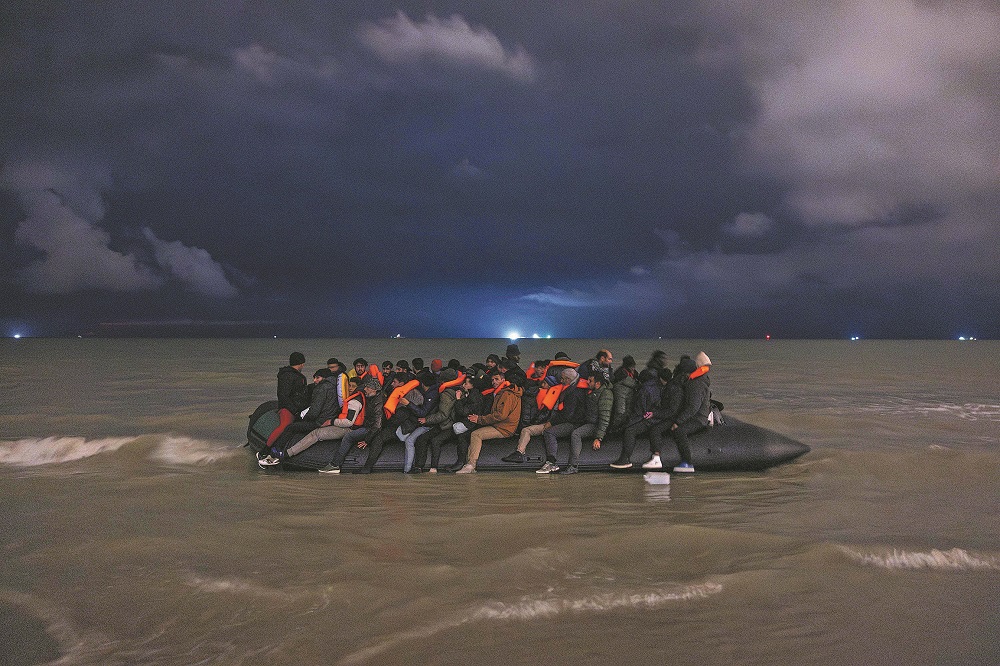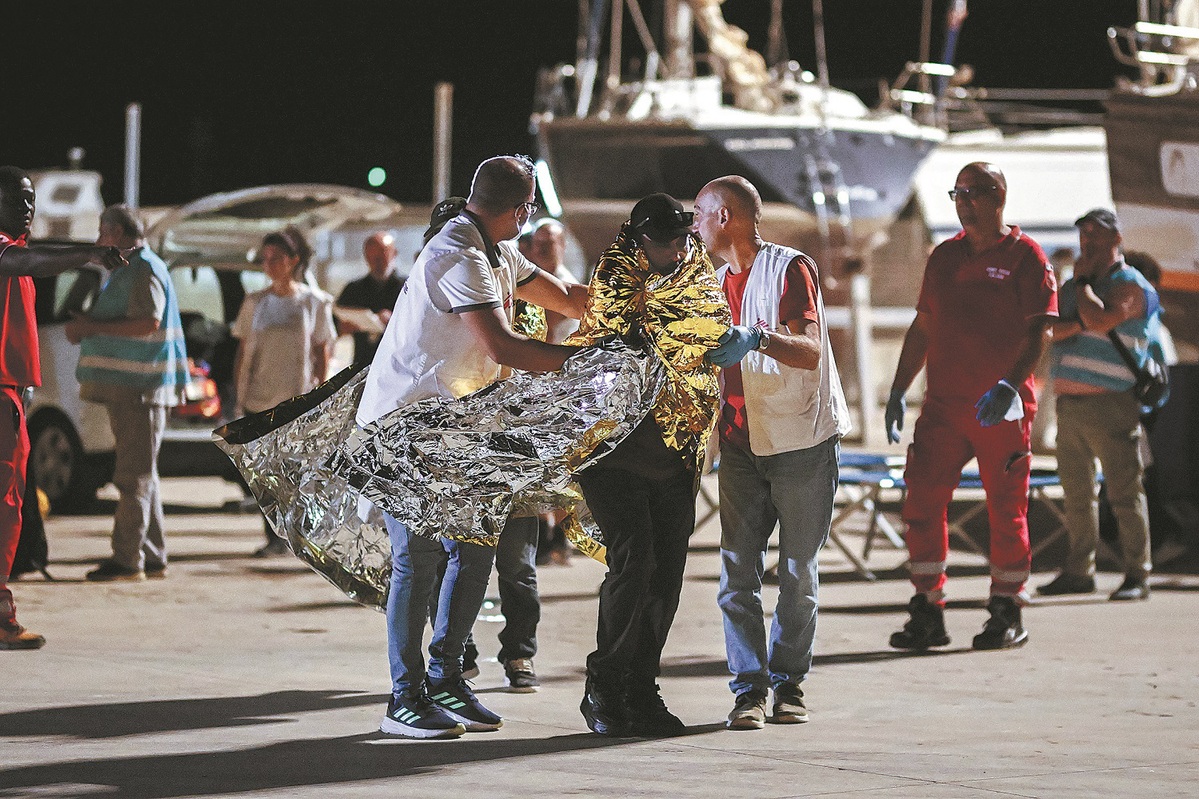
Migrants board an inflatable dinghy on Bleriot Beach in northern France on Oct 30, attempting to cross the English Channel. SAMEER AL-DOUMY/AFP
Whether it was the conflict in Ukraine surpassing 1,000 days or a record number of deaths among migrants trying to cross the English Channel, the mass movement of displaced populations in and around Europe remained a grim headline fixture in 2024.
The United Nations' refugee agency, UNHCR, projected Europe's forcibly displaced and stateless population to increase by 2 percent to 24.9 million people in 2024, and its effect was felt everywhere.
In June, elections took place for the European Parliament, whose cross-border structure means voters can sometimes find issues that do not necessarily directly affect their own country end up influencing the overall outcome, which, in turn, makes those issues locally relevant. One issue above all affected all 27 European Union states, and the result: migration.
Just a month prior to the elections, the EU adopted the Pact on Migration and Asylum that aimed at "managing migration and establishing a common asylum system at EU level".
The pact envisions sharing out migrants among EU countries, with the people having no say in where they are sent, and countries either accepting their quota or offering logistics support or financial contributions to assist others.
However, it is already facing opposition, as national attitudes toward the welcoming of migrants, and also the ability and willingness to accommodate them, vary sharply, and the election outcome presented a very different vision of the future.
While no single political bloc won a majority of the 720 seats, there was a swing to the right, fueled by migration.
Heading into 2025, the migration challenge remains as big as ever, and the successes of parties, such as France's National Rally and Germany's Alternative for Germany, at the national and EU levels suggest that the prevailing mood is becoming less tolerant and more hostile.
Two of the biggest sources of migrants have been Syria and Afghanistan, and the fall of the Bashar al-Assad regime in Syria has led many European countries to halt asylum claims for Syrians, or to suggest that they should return home.
For all their differences, immigration is one topic on which Europe's right-wing parties share much common ground, and 2024's results tightened their grip on the policy steering wheel.
It was noted in a paper published by the Chatham House think tank after the June election that one consequence of the emboldening of the right is that "centrist parties have tried to adopt far-right narratives on immigration at both national and EU level, hoping to retain voters who might otherwise consider defecting to far-right parties".
One suggested remedy is return centers. Details remain vague, but it would mean if an asylum application is rejected, the person would be moved to a facility outside EU territory as the start of their ejection process.
These were discussed at an EU summit in October, and referred to in a letter from European Commission President Ursula von der Leyen to EU leaders.
"We should … explore possible ways forward as regards the idea of developing return hubs outside the EU, especially in view of a new legislative proposal on returns," she wrote.
However, they would be a minefield of complexity, something Italy has already encountered in its plan to send asylum-seekers to detention camps outside EU territory while their applications are processed.
Italy's geographical location, sticking out into the Mediterranean Sea, puts it on the migration frontline. In the first six months of 2024, 25,345 migrants reached Italy, many by boat, a 60 percent decrease from the corresponding period in the previous year.
In November 2023, Italy agreed to a five-year deal with Albania to host Italian-built and funded camps, with Prime Minister Giorgia Meloni telling newspaper Il Messaggero at the time, "I believe (the deal) could become a model of cooperation between EU and non-EU countries in managing migration flows." But the detail has been more complex than the headline.
The first group of 16 people were sent in October, only to come back after a court ruled the countries of origin to which they may be returned if their bids failed could not be regarded as safe, and a month later, staff members also returned home.
"What remains in Albania is a colossal structure built by local entrepreneurs with Italian taxpayers' money, destined to decay," former prime minister Matteo Renzi wrote on X.
"What remains in Albania is Giorgia Meloni's face, responsible for an unprecedented waste of resources driven only by an electoral whim. And the judges have nothing to do with this, make no mistake: the Albania operation doesn't hold up, both in terms of numbers and the law."
Albania emphasized that this arrangement was exclusively on offer to Italy, rather than for general hire, because of what Prime Minister Edi Rama called the country's "unconditional love" for Italy, which some observers have linked to Albania's own bid for EU membership.

Members of Doctors Without Borders help a migrant with a blanket at the port of Roccella Ionica, Italy, on Sept 29. An Italian Coast Guard patrol vessel had taken 79 migrants from Iran, Iraq and Egypt to the port after their departure from Turkiye. VALERIA FERRARO/NEWSCOM
Warning to all
However, Eva Singer, from the Danish Refugee Council, told Euronews that Italy's experience should be a warning to all.
"EU countries are talking about (outsourcing) as if you can just decide what happens outside of the EU, but we're talking about independent countries that have their own interests," she said. "I don't see why these countries would accept taking over the responsibility from Europe."
For the second half of 2024, Hungary held the rotating presidency of the Council of the European Union, and in October, Prime Minister Viktor Orban made his position clear.
"I have been chest-deep in the bloodbath of the migration debate for quite some time," he said. "Since 2015, I have been saying the same thing: We can try all kinds of pacts, but there is only one way to control migration — the external hot spot.
"The only immigrants who stay out are the ones we don't let in ... in the end, there will be agreement between states to have external hot spots."
Meloni and Orban met twice during Hungary's presidency, and after their second meeting they issued a joint statement confirming their commitment to tackling irregular migration through "enhanced collaboration with countries of origin and transit".
Although, as someone who has attained power, Meloni may be seen as a standard-bearer for Europe's right-wing parties, the reality is more nuanced.
"In the elections in 2022 (when Meloni came to power), a record low number of Italians voted, just 63.7 percent, a 20 percent drop compared to the 2008 election," Simona Guerra, a senior lecturer in comparative politics at the University of Surrey in England, told China Daily.
"At the European elections, commentators expected massive gains for the radical right, which happened to a degree, but with the vote in Germany (Alternative for Germany finished with the second-largest vote share) and France (National Rally won nearly one-third of the vote) disproportionately affecting the overall figures."
Meloni's confidence in the Italy-Albania deal was enough for von der Leyen to tell EU leaders "we will also be able to learn from this practical experience".
Reality has proved otherwise, however, with the deal so far involving great outlay and no concrete results.
"The operation costs 9 million euros ($9.3 million) annually to Italian taxpayers and the cooperative managing the hub was awarded a 133-million-euro contract," Guerra said.
"At the same time, according to the Italian Statistics Institute, there are now more than 5 million Italians (9.7 percent of population) living in absolute poverty. Also, the agreement between the two prime ministers bypassed the Albanian constitution, which would have required the consent of the president of the republic."
In the European Parliament, the Patriots for Europe bloc, which includes Orban's Fidesz party, supports the idea of external repatriation centers, so is Meloni really an inspiration in this way? "Not according to European law," Guerra said.
However, Meloni remains committed to the policy, going as far as to say in a speech in December that "the centers … in Albania will work, even if I have to spend every night there from now until the end of the (term of the) Italian government".
Guerra explained, "It enables her to control two narratives — on one side the protection of the country, and the other the hostility of the judiciary, against the interests of the nation."
Comparative stability
With France in a state of turmoil, and Germany facing an election next month, Meloni represents a figure of comparative stability on the European political landscape.
In addition, Donald Trump's return to the White House as president will turn world politics on its head, with huge implications for migration and for Europe — he has already promised mass deportations in the United States — and the increased likelihood of the Russia-Ukraine conflict ending, meaning more turmoil and displacement there, which will have a huge impact on Europe.
Trump's second presidential term is the great unpredictable event for world politics in 2025, but for Meloni, it could be a chance to entrench herself as the leader of the European right, as she has a history with him.
In 2018, Trump's adviser Steve Bannon attended Meloni's Atreju political festival, and in 2020, she was a guest at Trump's Washington National Prayer Breakfast.
Before he is back in office, Meloni is positioning herself to be a bridge between Brussels and Washington. "She has been telling the Italian Parliament not to be hostile to Trump, as it doesn't create conversation," Guerra said.
How Europe's challenge in handling migration in 2025 changes remains to be seen, but the issue will not go away.